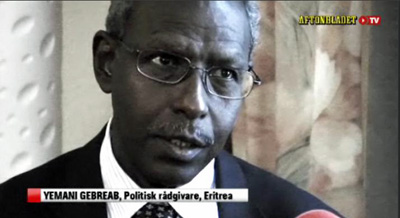On Sunday, a senior Eritrean official added to the painful uncertainty endured by the families and colleagues of the imprisoned journalists, such as Eritrean-Swedish journalist Dawit Isaac, by stating that the government had decided to “move forward,” leaving the journalists and other jailed political dissidents in the eternal oblivion of indefinite detention.
Yemani Gebreab, a senior adviser to Eritrean President Isaias Afeworki, said this in an exclusive interview with Swedish freelance journalist Donald Boström published on the website of Sunday leading Swedish daily Aftonbladet on Sunday. Gebreab, head of political affairs of Eritrea’s ruling Party For Democracy and Justice, and a target of U.S. sanctions in connection with Eritrea’s alleged involvement in Somalia, was in Sweden attending last week’s Eritrean Festival, an annual fundraising and cultural event exclusive to expat supporters of the Eritrean government.
Asked about the basis of Isaac’s imprisonment, the 59-year-old former top propagandist for Eritrea’s guerilla liberation movement said the journalist was being held for “very serious crimes regarding Eritrea’s national security and survival as an independent state.” Pressed for details about the alleged crimes, Gebreab said Isaac was involved in a “conspiracy” by a group of Eritreans “to facilitate” an invasion of the country by archfoe neighbor Ethiopia during the bloody border war between the two countries.
Aaron Berhane, the exiled former editor-in-chief of Isaac’s newspaper, Setit, remembers the war period very differently. “At that time, the Eritrean government supported the private press by all means,” he told me, explaining that authorities gave journalists the go ahead to move freely, and exempted them from military draft. “We never criticized the government during that war because the Eritrean press law did not allow us to speak on internal affairs during wartime,” Berhane said. “The government was happy with that because we were focused on countering the Ethiopian propaganda and mobilize people to defend the country.”
The war simmered to it present stalemate in June 2000 and by the time the Eritrean government carried out the September 2001 roundup of political dissidents and editors such as Isaac, the private newspapers had shifted focus toward scrutinizing national affairs. “Once the border conflict was over, we said we now have to look at what’s going on in the country and when we started asking tough questions, then the government became very upset,” Berhane said.
Isaac’s brother, Esayas, who lives in Sweden, had harsher words about Gebreab. “You know, these guys always come up with a new conspiracy every year,” he said. “Last year, it was the so-called CIA plot. This is not surprise for me or any serious Eritrean. Everyone who has followed this case knows he’s a liar.”
Gebreab’s comments at times did appear to be at odds with facts. “We were never given an opportunity to express our point of view on this issue,” he claimed, adding “there’s nothing we hide, and therefore we’re willing to communicate and express our views.” Yet, just seconds later, when Boström asked him to give assurances as to whether Isaac was still alive, Gebreab deflected: “I don’t think there’s any point in discussing the specifics of the issue and I have given reason why he’s in detention. The specifics I don’t believe are very important.”
Questioned about Eritrea’s refusal to grant Isaac a day in court, Gebreab was equally vague. “This is a special case for us,” he said. “For this reason, there was a deliberate decision made by the Eritrean government and explained and discussed by the Eritrean people that this was the best way for us to go.”
He justified the Eritrean policy by saying, “We can talk about many, many countries over the past decade or so, especially after the events of 9/11. Many countries have held people they felt were a serious threat to their security.” He went on: “So I don’t think it’s fair to accuse Eritrea on this point and I don’t believe that many of those who accuse Eritrea on this issue really have the moral high ground to accuse Eritrea on this issue.”
While Eritrea is among the few nations as diverse as Iran and the United States who have detained journalists for prolonged periods without charge or trial, the Red Sea nation stands out as the only country to maintain that the condition of the journalists is a state secret while denying them due process. Some of the imprisoned journalists are believed to have died in custody, including Fessehaye ”Joshua” Yohannes.
Perhaps it’s not surprising then that Gebreab should ask: “Can’t Swedish media find something positive to say about Eritrea?”
